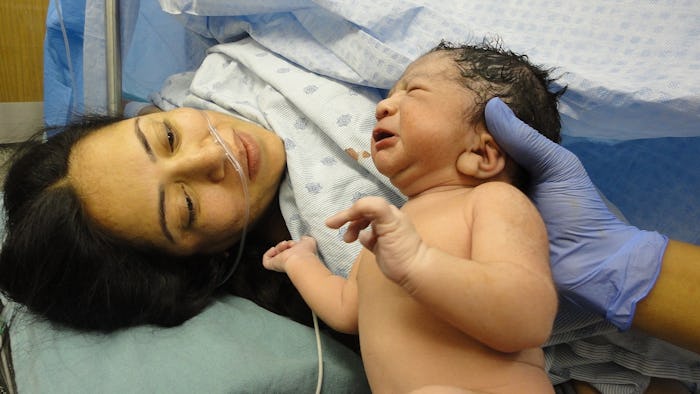Moms-to-be enter the delivery room nervous and hoping everything will run smoothly. They have heard that even the most difficult labors are quickly forgotten the moment a mom holds her new baby. But, what if the birth experience is less than ideal — even downright frightening — and a mother finds herself traumatized by the events? Whether it is a life-threatening emergency, or feeling neglected by the hospital staff, a mom can leave the hospital with birth trauma. Concerned friends and relatives might wonder how to help someone who's had a traumatic birth, what can they do to help her cope?
First, in order to help, you have to understand what is considered a traumatic birth. It isn't simply feeling upset about having a difficult birth. Birth trauma is, in fact, post traumatic stress disorder (PTSD) that occurs after childbirth, according to the Birth Trauma Association (BTA). And if you've gone through this, you're not alone. Postpartum Support International (PSI) reported that approximately nine percent of women experience PTSD following the birth of their child. Moms may have flashbacks to the traumatic birth, anxiety, panic attacks, difficulty sleeping, and even a sense of detachment.
It is important for friends and family to reach out and help moms with birth trauma seek help so that they can recover. Here are some ways you can help a mom who's had a traumatic birth.
1Listen To Her Story
One of the best ways to moved passed a difficult experience is to open up about it. Make yourself available to listen to her birth story, over and over again if necessary. Moms who've been through traumatic birth experience often feel as though they were not listen to in the delivery room. Be the person that listens to her.
2Offer To Babysit
Midwifery Today suggested that moms dealing with the aftereffects of a traumatic birth should accept extra help with the baby. It can be difficult for a mom to care for an infant who indirectly was responsible for her negative experience. They may not yet feel connected or may even have very negative feelings about their baby. Help her ease into motherhood by giving her a break from the round-the-clock care of her baby. Gradually, her feelings about the baby will change and become more positive.
3Join Her In A Therapeutic Activity
Many women find that sketching, painting or sculpting can draw out the images that are haunting them and help alleviate their emotional pain, according to Midwifery Today. Physical exercise can also help moms alleviate some of their stress and anger associated with a traumatic birth experience.
4Encourage Her To Write
Journaling about the experience can help a new mom work through her negative emotions and fears. On her site, psychologist Gayle Peterson suggested the mom to write down the ways her body did a good job. Midwifery Today noted that writing letters to the people who were involved in her birth can be very therapeutic, whether she chooses to send them or not.
5Give Her A Hand Around The House
A messy home can be stressful to a new mom, not to mention a mom who's recovering from a traumatic birth experience. Help her avoid additional stress in the few weeks after delivery by sweeping, mopping, wiping down the counters, or even putting on your yellow gloves and scrubbing down the bathroom for her.
6Bring Her A Favorite Meal
The littlest things can mean a lot to someone who is recovering from a traumatic situation. Keep her off of her feet and treat her to her favorite dinner. People tend to open up over a meal, and conversation can help with emotional healing.
7Help Her Visualize A Positive Birth
Peterson suggested that moms struggling with a traumatic birth experience can try visualizing a positive birth. This means walking through the steps of what would have been her ideal birth in order to create an alternate image of the birth in her mind. Midwifery Today also discussed ways in which moms can "relive" their birth experience in order to create a new and positive memory.
8Help Her Research Therapists
If things don't improve, it might be time for her to seek professional help. You can do your part by researching local doctors and counselors with birth trauma or PTSD experience.
